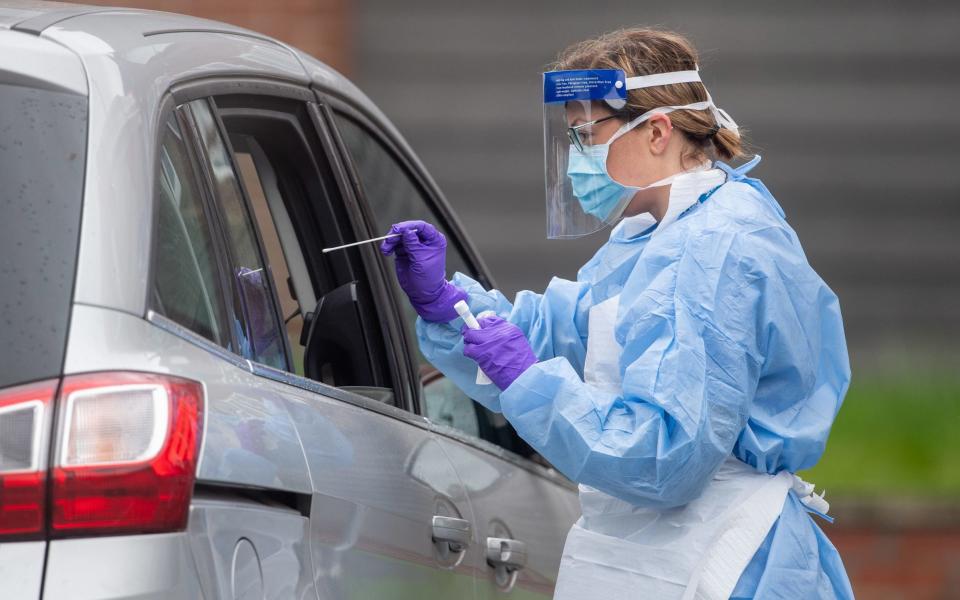Neighbours urged to call police on Covid self-isolation cheats


Neighbours are being encouraged by the government to report Covid sufferers who are not self-isolating to the police, on the day it becomes an offence punishable with a fine of up to £10,000.
Police will also conduct spot checks in areas with high infection rates and in high-risk groups based on “local intelligence”.
It comes amid concerns that people are becoming increasingly fatigued by lockdown measures and suggestions by Boris Johnson that the virus is spreading because people are not abiding by the rules.
The new legal duty to self-isolate, which comes into force on Monday, covers anyone who has tested positive for coronavirus or has been contacted by NHS Test and Trace and told to stay at home.
Like other coronavirus restrictions, it has not been subject to a vote in Parliament, and the Prime Minister has been warned he faces “certain” defeat this week if he refuses demands to give MPs more of a say in future.
Up to 100 Tory MPs are now said to be ready to back a proposed amendment to the Coronavirus Act which would force ministers to give Parliament a vote on future changes to national coronavirus regulations.
More than 50rebels have publicly backed the amendment, tabled by Sir Graham Brady, chairman of the 1922 Committee of Tory backbenchers, which would wipe out Mr Johnson’s working majority of 85.
They believe the Government will back down at the last moment if the Speaker selects the amendment for a vote, and party whips are said to have abandoned any attempt to bring the rebels into line.
Matt Hancock, the Health Secretary, wrote to all Tory MPs on Sunday explaining why the Coronavirus Act in its current form was needed, only to be accused of “missing the mark” by rebels who say the Government will be in a stronger position if future Covid measures have the backing of Parliament.
The Government made it clear on Sunday night that it will act on tip-offs from “third parties” who have “identified others who have tested positive, but are not self-isolating”.
Whitehall sources confirmed that police would be expected to investigate calls made to its 101 non-emergency number as well as “investigating and prosecuting high-profile and egregious cases of non-compliance”.
Among the steps that will be taken to make sure that people are complying with the rules, the government also cites "using police resources to check compliance in highest incidence areas and in high-risk groups, based on local intelligence" and "NHS Test and Trace call handlers increasing contact with those self-isolating".
Earlier this month the Prime Minister was at odds with his own ministers after he said he was not a fan of “sneak culture”.
It came after Priti Patel, the Home Secretary, said she would report her neighbours if she saw them breaking the Rule of Six.
Ms Patel put people on notice that police will crack down hard on those who are reported on Sunday, saying: “These new measures are about saving lives. Everyone must take personal responsibility and self-isolate if they test positive or if told to do so by NHS Test and Trace.
“For those who fail to do so, the police will enforce the law. These new fines are a clear sign that we will not allow those who break the rules to reverse the hard-won progress made by the law-abiding majority.”
Her comments, and the Government’s insistence that it will act on public tip-offs, will be seen as a warning to police forces that they must enforce the new law, following rows with police chiefs who had indicated a reluctance to dedicate resources to coronavirus crackdowns.
It comes after Mr Johnson said the Army could be brought in to help with the response, in what police chiefs saw as a direct challenge to their authority.
People who fail to self-isolate can expect to be fined £1,000, rising to £10,000 for repeat offenders.
Ministers are increasingly alarmed by research which suggests that after six months of coronavirus restrictions the public has grown tired of being told what to do.
Last week a survey by King’s College London, University College London and Public Health England found that just one in ten people contacted by NHS Test and Trace had stayed at home for the required 14 days.
Mr Johnson laid the blame for the current increase in infection rates at the door of the public, saying Britain was a “a freedom-loving country” and it was “very difficult to ask the British population uniformly to obey guidelines in the way that is necessary."
If someone receives a positive test result, they are now required by law to self-isolate for the period ending 10 days after displaying symptoms or after the date of the test, if they did not have symptoms. Other members of their household must self-isolate for the period ending 14 days after symptom onset, or after the date of the initial person’s positive test.
People who are contacted by NHS Test and Trace and told to self-isolate are also legally obliged to do so. Anyone on a low income who is required to self-isolate and is unable to work as a result can claim a £500 Test and Trace Support Payment.
Mr Hancock, the Health Secretary, said: “Anyone can catch coronavirus and anyone can spread it. We all have a crucial part to play in keeping the number of new infections down and protecting our loved ones.” He warned that if infections continue to rise “we will not hesitate to put in place further measures”.

 Yahoo News
Yahoo News 